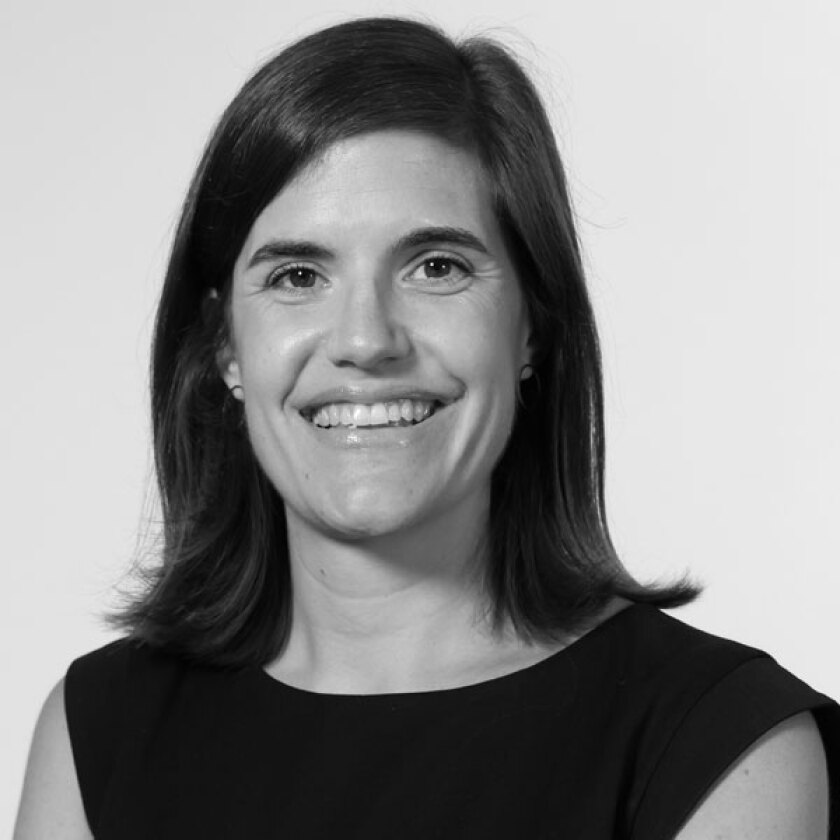“Kimberly, am I going to be OK?”
I knew what my client was asking — and it wasn’t just about her portfolio. As I looked at her through the computer screen, I could see a whole world of worry crowded into her face. She was about three years out from retirement, and the volatile stock market topped the headlines every day. She was worried about her finances, sure, but she was also worried about the health of herself, her family and her friends.
She wasn’t just asking if she would still be able to afford her retirement; she was afraid she might not be around to retire.
As I work toward my certified financial therapist designation, this kind of conversation has become the norm. I would guess many of you are also becoming beacons of hope to your clients in an otherwise fear-filled world.
In my client’s case, my answers to her asked and unasked questions about safety were, “Yes”!

As I have spoken with my clients who are nearing retirement during this pandemic-induced market rollercoaster, I have communicated one basic principle: Focus on what you can control. This applies equally to taking care of your finances and taking care of your health. After that, I have reviewed their fixed-income holdings, discussed certain muni funds and counseled debt management.
To start, I begin with my mantra: “Stay diversified; stay your course.” I remind them they have a well-diversified portfolio that is tailored to their specific risk tolerance.
This is especially true for clients who are on the glide path toward retirement. They are typically holding more fixed-income assets than equities, so I remind them that while the Dow may be down 30% (as it was in March) that doesn’t mean their portfolio is down by the same amount. In most cases, clients just need a reminder that their portfolio value doesn’t march in lockstep with the Dow, the S&P 500 or any other stock index. “Diversification is your friend,” I tell them. “We build diversified portfolios precisely for markets like this.”
Analysis of their performance — and fees — may reveal some surprises.
When we focus on what we can control — maintaining proper diversification and asset allocation — we can ride out the market storms without fighting anxiety every minute of the day.
Fixed-income strategies
For clients predominantly in fixed-income portfolios, I remind them we have been structuring their holdings so that they can live off the “drip” — the steady inflows of bond interest and stock dividends from their investments.
We are still finding yields in municipal bonds with slightly longer maturities.
Of course, as interest rates have steadily dropped over the last few years, that has become more challenging, but we are still finding yields in municipal bonds with slightly longer maturities and these are yielding better than Treasury, or even corporate debt, at similar maturities. I am advising some clients to ladder maturities in order to lock in more dependable tax-free income streams, especially for those in states with high income taxes like California.
I’m also utilizing muni funds, and I especially like ones such as Dimensional Fund Advisors and Vanguard that feature very low expense ratios; that just allows me to put more net income in my clients’ pockets. In fact, we pay very close attention to all the associated expenses. As my mother always reminded me, “A penny saved is a penny earned.”
Employee Benefit News' March/April issue explores how workplaces are navigating pandemic challenges and making plans to return to the office.
The Internal Revenue Service released information on how employees now have until the end of the year to repay any payroll taxes they deferred from last year.
CPA firms will be in a great position to help their small business clients with the latest round of the Paycheck Protection Program, according to Barry Melancon.
However, particularly in the current environment, it’s good to exercise some caution, even in the selection of municipal obligations. Not all municipal bonds are created equal, and as the COVID-19 pandemic forever alters the economic landscape I’m emphasizing State GOs, hospital bonds and other issues that are less likely to be directly impacted by what I foresee to be a dramatic shift in the ways Americans work, travel and pursue education.
I’ve also been utilizing funds like Vanguard Utility Fund, with a 3.60% yield and 10 basis point expense ratio. This affords my clients the ability to maintain a 5% allocation to a conservative assets class while still generating that all-important “drip.”
Debt counseling
Another piece of advice I have for people nearing retirement, especially during this market downturn, is to avoid taking on additional debt. Controlling expenses and avoiding debt are two of the most important keys to a thriving retirement in the future.
“This isn’t the year to put expenses on your credit cards,” I tell them. “Instead of a weekend vacation out of town — which you probably shouldn’t do anyway, considering travel restrictions in some states — why not consider a relaxing weekend in your own backyard?” Take back some control where nonessential expenses are concerned and leave the credit cards in the drawer.
When the pandemic is under control and life starts returning to normal, clients who exercised extra caution around expenses and debt will make a much faster recovery than those who have to dig out of a hole created by unnecessary borrowing. By focusing on what they can control — their spending habits, especially in the present circumstances — they can put themselves in a position to thrive later on when they’re ready to retire.
Focus on personal risk exposure
During the COVID-19 pandemic I’ve also been advising all my clients — not just those in or approaching retirement — to follow the CDC guidelines for social distancing and hygiene. In fact, I have a new mantra: “Stay Safe, Stay Home, Stay Hopeful.” We can’t control the spread of the virus or the rate of infection everywhere, but we can do something about our own exposure to risk.
Whether we’re discussing finances, family worries, coronavirus, or the markets; I want clients to focus on what they can control, and to exercise control wherever they can. When I can help them do that, I’ve given them the best advice there is. And I can tell them, as I did my client during the video chat, “Yes, you’re going to be OK.”











